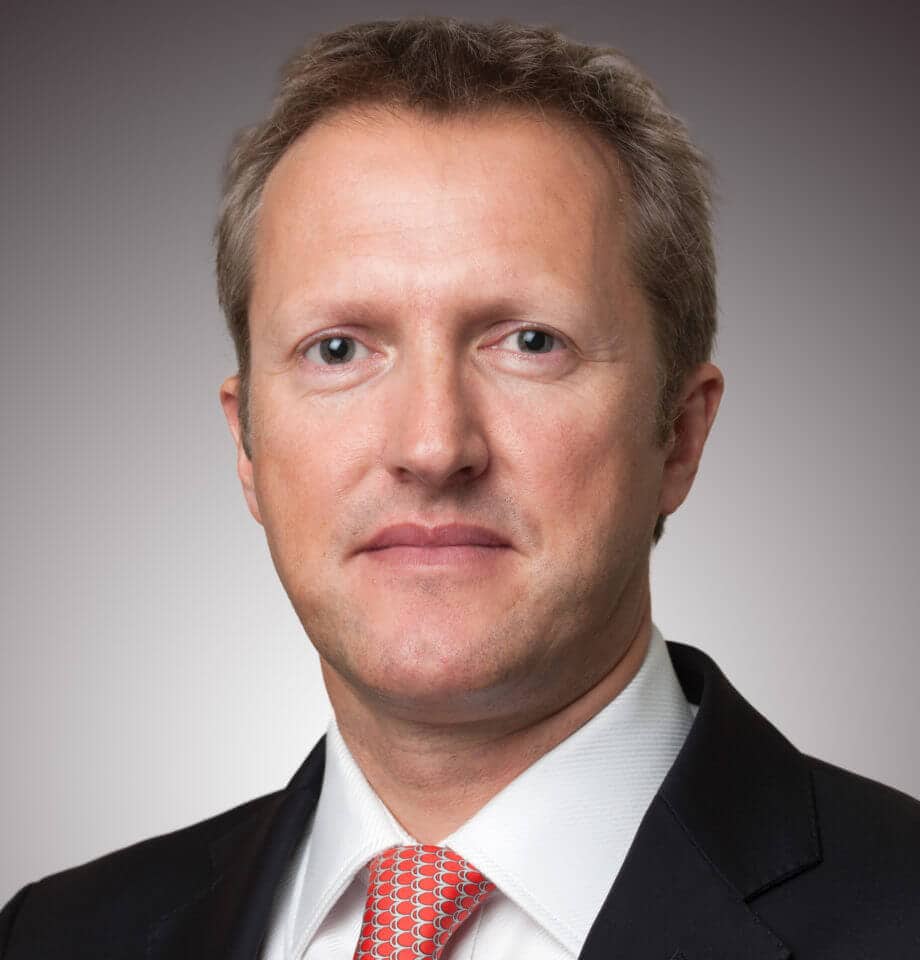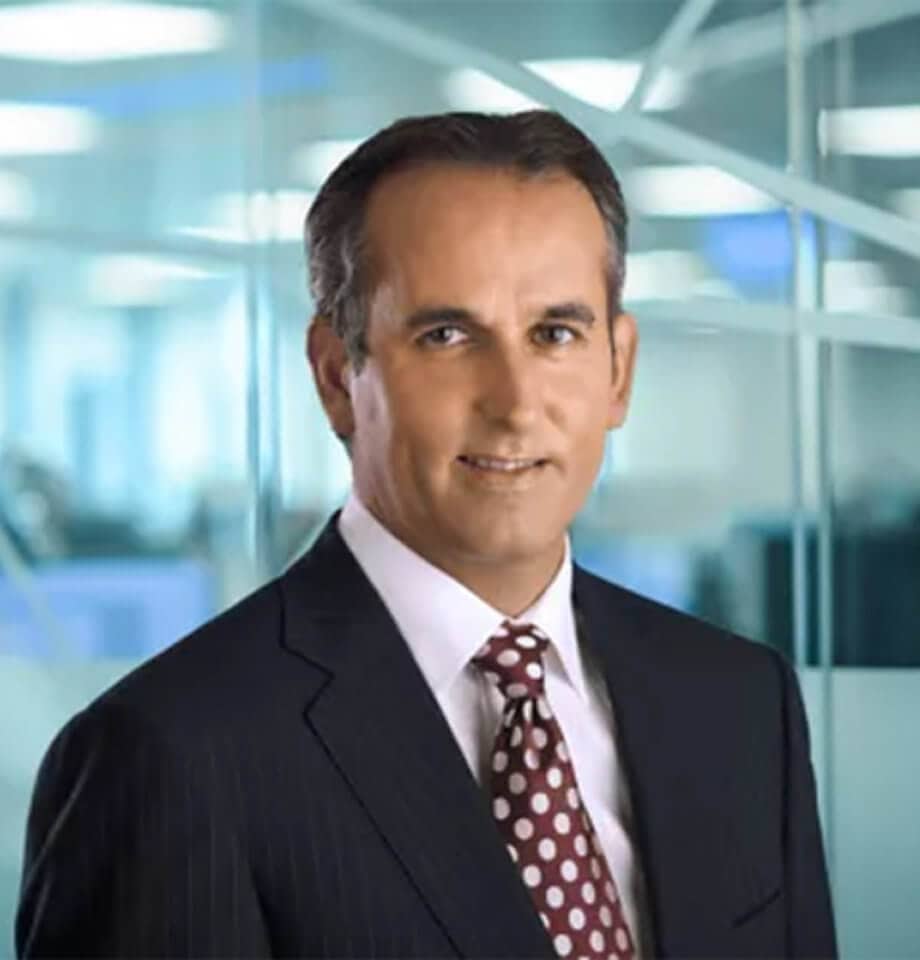
I started my career in the private wealth/investment management sector in 1987, having joined Mercury Asset Management working in the Securities Department and supporting the London based private client and institutional investment management teams. In 1990 I joined Allied Provincial Stockbrokers (C.I.) Ltd, which was acquired by Quilter Goodison in 1991 and took over the management of the Jersey office in 2004.
Since that time, amidst a backdrop of various company ownership changes including Citigroup, Morgan Stanley and Old Mutual, the Jersey office’s international client base and reach has continued to grow, leading to the opening of a branch office in Dubai DIFC in 2016.
Over the decades we have seen the finance industry not only grow exponentially but radically adapt to meet the challenges of a changing global financial and macroeconomic backdrop. Clients, be they private or corporate, have become ever more discerning in their solution and servicing needs, requiring considerable investment, development and innovation from
the provider firms – be they from the banking, investment management, fiduciary or legal sectors.
Quilter Cheviot have continued to maintain their leading reputation and evolve their service offering, drawing upon their considerable group resource. One obvious example is the support provided to the 170 strong investment managers across our 14 offices, with the further benefit of Quilter Cheviot’s strength of research capability within the discretionary fund management industry, which consists of 22 qualified in-house analysts.
This year marks a major landmark moment for Jersey; it has been 60 years since the Island’s designation as an international finance centre. This was a pivotal change that put Jersey on the map in the world of financial services and has proved to be a resounding success.
The last six decades have seen Jersey’s financial services sector flourish. The Island has come a long way since the 1960s, when banks began to establish offshore operations meaning Jersey was soon home to 50 of the world’s top 500 lenders. In the late 1990s, following the election of the Blair Labour government, the Island’s financial regulator, the Jersey Financial Services Commission, was established, as well as The Channel Islands Stock Exchange.
In further evidence of success, the 2000s brought Jersey recognition on a truly international scale, when it was included on the OECD’s ‘white list’ alongside the UK, USA and many member states of the European Union. This made Jersey a top tier jurisdiction that had “substantially implemented the internationally agreed tax standard”.
Since then, Jersey’s international recognition has only grown.
Just this year, the Island joined 130 countries in support of the OECD’s statement on Global Business Taxation, which should see global companies, including the likes of Google and Amazon, taxed at a rate of 15% once the new tax regime is implemented.
As well as its success on a macro level, there is plenty of evidence that demonstrates that Jersey continues to appeal to those operating in private equity (PE), venture capital (VC) and alternatives. In Jersey’s time as an international finance centre, alternative assets have grown beyond all expectations, in turn requiring an increasingly sophisticated governing regulatory framework. Despite intense competition among popular jurisdictions for alternative investments and the increasingly complex regulatory environment, Jersey has remained an attractive jurisdiction in which to do business. Data from the Jersey Financial Services Commission shows that in 2020 the value of PE and VC funds domiciled in Jersey increased by 21% year-on-year to £165 billion.
The future of Jersey’s financial services sector looks bright. While nobody could have predicted COVID-19 and its fallout, I believe the way Jersey’s financial sector reacted to it demonstrates the Island’s ability to meet future challenges head on.
The Island’s swift and effective response to the pandemic from a logistical, regulatory and legislative perspective demonstrated its adaptability. Despite four rigorous lockdowns and a constrained lockdown environment, Jersey’s funds sector maintained a ‘business as usual’ focus, ensuring the finance industry contained the necessary compliance while working from home and maintained stability despite the obvious challenges brought about by COVID-19.
As a result of the Island’s resilience and adaptability, Jersey’s fund authorisations unit and registry stayed open and was well equipped to support businesses throughout the pandemic. In fact, in a year I am sure none of us will ever forget, 100 new Jersey private funds launched – a ringing endorsement of the structure’s appeal, especially given the market and logistical challenges of 2020.
Last year also marked the moment the UK formally left the European Union. Following the exit, Jersey maintained a flexible regulatory position and remains fully committed to equivalence with the EU’s 5th Anti-Money Laundering Directive. The timely introduction of substance laws further demonstrated the Island’s good governance credentials in tax, leading to renewed recognition as a cooperative jurisdiction by the EU’s influential Code of Conduct group.
I would like to now formally extend my congratulations to Jersey on its 60-year anniversary as an international finance centre. In six decades, Jersey has transformed its financial I joined the industry in 1993 having decided not to head off to university at the very last minute. This was a big decision at the time with many of my school friends heading off the Island to undertake university courses but my attention was grabbed already by a finance company and the prospects it could offer me to work and study at the same time.
I have no doubt that Jersey will continue to build on its existing success by constantly adapting to the world around it and providing a robust but flexible regulatory structure that enables the financial sector to continue to grow and innovate. The dual challenges brought about in tandem by Brexit and COVID-19 showed how capable Jersey’s financial services sector is and I have every confidence the sector will continue to grow and innovate in the coming years.

I joined the industry in 1993 having decided not to head off to university at the very last minute. This was a big decision at the time with many of my school friends heading off the Island to undertake university courses but my attention was grabbed already by a finance company and the prospects it could offer me to work and study at the same time.
The finance company was Abacus Financial Services – the trust arm of PwC – and they had attended various schools and colleges to market the business and introduce the students to the financial services industry. Based on this, I joined Abacus and haven’t looked back since.
I studied the ICSA qualification through to professional level and do not feel like I missed out by getting into the industry straight from school. Eighteen seems young to head into the industry but more and more opportunities are available to join the finance arena from school and we encourage both school leavers and graduates to join our teams.
I have since worked in several senior positions prior to joining Suntera Global as a Manager in 2010 and was appointed to the board of Suntera Jersey in January 2017. In September 2019,
I was also appointed as a Group Director of Suntera Global and am the Head of Private Wealth in our Jersey office. I am supported by a team of six private client directors who each head up their own private client teams.
I consider myself to be conscientious and a real people person, both of which bode well in our industry where client relations are paramount. I work closely with each individual client to ascertain their needs and meet them as we are more than a service provider, we are a partner and have worked with most of our clients’ long term so really feel we know them well. Being a people person is also key to leading my directors and being a role model to all our Jersey staff.
One of the highlights of my career was when I won the Citywealth Trustee of the Year award for the Channel Islands and Isle of Man in January 2019 and I am honoured to have been shortlisted recently for their Woman of the Year – Leadership – Financial Organisation (CEO/Board Member) award. Another highlight since I joined the industry has been the enhancements to Jersey’s Trust Law. Whilst the law has been the backbone of the wealth management industry since its introduction, there is always scope to tweak it in order to make it more attractive for potential clients. The introduction of the Foundations Law in 2009 was another milestone and so was the more recent Charities (Jersey) Law, both legal innovations which have served as a platform for increasing philanthropic activity.
From a client perspective too, it is a very different – far more regulated – environment, for financial services. Fortunately, Jersey has a history of strong regulation and an excellent legal system. They are among the key building blocks in our wealth management proposition and sit alongside our political and economic stability, tax neutrality, global connectivity, ability to innovate in response to market demands and of course our many very experienced finance industry professionals.
The infrastructure created by the 13,000 strong workforce, who work for some of the world’s leading banks, fund and corporate services providers; some of the largest offshore law practices and professional service firms, as well as a range of experienced and long-established trust and wealth management firms, has ensured the perfect environment to support the ambitions of global investors, so I have no doubt that we will continue to overcome future challenges and seize opportunities.
Scrutiny of financial services has been a feature of the wider global industry, especially during the last 20 years but Jersey has been able to negotiate these hurdles and ultimately obtain endorsement for the quality of its regulatory regime time and again from influential global organisations.
I have also witnessed the increasing global nature of the private client market which has led the industry in Jersey to reach out to new regional markets. Many firms in the trust sector have amalgamated or invested in strategic expansion to bolster their global office network and in so doing enhanced their private wealth offering.
Over the years, I have had the pleasure of working with many experienced and successful mentors in the industry who have greatly added to my personal success and enjoyment of the business.
It is a real honour and pleasure to have grown up in Jersey and had the opportunity to represent the Island in our industry and to have seen the jurisdiction grow and develop and remain at the forefront of international finance centres.

I began my career training as a Chartered Accountant and qualified in 1983 before deciding in 1988 to move away from accountancy and join the trust and corporate operating arm of local law firm Michael Voisin & Co which later became VG. I expected that this would be a good short-term steppingstone into a larger organisation where I would have more opportunities to work on international transactions. Over 30 years later, that temporary steppingstone has provided me with a career that I could never have envisioned in an industry that has evolved, both technologically and in prominence, with a variety of work that exceeds any concept of international finance I had in 1988.
In 2020, the leadership team and I were changing our policies to allow for digital signatures in light of the pandemic; this was a leapfrog from my role in 1990 when I oversaw the installation of our first office wide network and ‘screen per desk’ policy at a time when many firms only had a ‘screen per team’. That first office wide network ran on a dumb terminal attached to a server which had an Intel 286 processor; my current iPhone has greater processing power and storage capacity than that whole network.
Initially, emails could only be received on a single PC connected to the World Wide Web via a dial-up modem which made it very, very slow to send and receive data. At the time, I recall discussing with my colleagues whether email would ever catch on. Now there is no doubt in my mind that the greatest change in to how we do business has been the profound increase in ease and speed of communication through the use of email, mobile devices and video. But, despite the past 18 months forcing us to rely solely on technology, I question whether it will ever substitute face-to-face, in-person interaction.
In 1995 the Swiss subsidiary of the Dar Al-Maal Al-Islami Group of Saudi Arabia approached VG to establish a Shariah-compliant fund investing in US real estate. Despite knowing nothing about the rules of Shariah Law and very little about the history of Islam or the Middle East, I was asked in my capacity as Director of Funds to lead this project. As a result, my career was given a completely new focus.
I quickly found myself working with other Middle Eastern financial institutions and studying a wide range of literature to learn about the application of Shariah Law in financial structures and then more widely about Islamic and Middle Eastern history and politics. One of my most memorable learnings was a two-hour meeting with one of the leading Scholars, Sheikh Nizam Yaquby, in 2000 to discuss various concepts in Company Law and the application of Shariah principles to the structure of an equity fund we were working on. I still find myself returning to some of the fundamental principles I learnt that day.
Over the years I have undertaken c.100 multi-country trips to the Middle East; one of my most memorable trips was in 2002 when I was invited by the Accounting and Auditing Organisation of Islamic Financial Institutions (AAOIFI), the leading standard setting organisation in Islamic finance, to speak at their annual conference in Beirut. The highlight was being driven in a police convoy to the Presidential Palace in Beirut where I had been invited to dinner by Prime Minister Rafic Hariri (sadly assassinated in 2005) and the Crown Prince of Bahrain. I now feel very much at home in the region and my involvement in this rather unusual area of work has led to passionate interest in the culture and history of the Middle East.
My move to VG in 1988 was against the advice of some peers; indeed, one senior tax adviser warned me against moving to work for the senior partner of the firm at that time. Over time I came to understand that this warning was based on the firm’s reputation for pushing the boundaries of Jersey corporate law and working on innovative transactions and structures that are still in use today; in my opinion, without the innovators like Michael Voisin and others, Jersey would not have become such an internationally recognised international finance centre.
I feel very lucky to have been involved in such a dynamic business environment which has seen many changes, changes in the types of business VG conducts and in particular changes in the way the offshore finance industry is structured and regulated.
The flexibility of Jersey’s corporate laws and the Jersey regulator’s readiness to adapt and match the ever-changing demands of our clients, has meant that in my 25 years of structuring Shariah-compliant transactions, I have yet to encounter a structuring requirement that could not be accommodated within those Laws. I am proud to be part of a finance industry that is so well respected (and indeed the envy of some) and have no doubt that this respect will continue as Jersey’s finance industry adapts to future challenges and opportunities.

Tax neutrality has been one of the main features of the Jersey tax system throughout my career. It has underpinned the establishment and growth of the international financial services industry. It is fair to say that without it, we wouldn’t have a successful and robust, leading financial services sector.
So what exactly is tax neutrality? It is a system that does not subject companies to additional taxation, recognising that underlying profits may be subject to tax where the income- producing assets are located and investors are taxed on their returns in their home jurisdiction. It therefore prevents unnecessary additional layers of taxation and provides certainty of the tax treatment, thus facilitating cross boarder investment.
Many jurisdictions provide tax neutrality. However, this is generally though a network of double tax agreements, which Jersey doesn’t have. As such, Jersey can only prevent unnecessary additional layers of taxation through other means of tax neutrality. I have lived through three main regimes.
When I first started work back in the mid-80s, tax neutrality was provided through the Corporation Tax regime. Jersey incorporated companies that ‘resided’ outside of Jersey were not liable to tax on their worldwide profits at 20% but subject to a corporation tax of £300. The main conditions were that no Jersey person beneficially owned the company, most of the directors were not resident in Jersey and management and control was exercised outside of the Island. The latter two conditions resulted in the unsavoury behaviour known as the ‘Sark Lark’, where Jersey incorporated companies appointed ‘nominee’ directors in Sark, while undertaking the company administration, including drafting of directors’ resolutions, in Jersey. The resolutions were then ferried to Sark where the directors, in addition to their day jobs of fisherman, farmers and even a couple of postmen, would sign them, obviously taking great care and attention, before shipping them back. Due to the small population of Sark, individuals were directors to a great number of companies, with one individual allegedly having over 3,000 directorships.
Recognising that this was not an appropriate way of doing international business, Jersey introduced the exempt company regime in 1989. On payment of an annual fee of £300 (which later increased to £600) and subject to certain conditions such as no Jersey resident beneficial owners, the company was subject to tax on a territorial basis, despite it being incorporate and/or managed and controlled in Jersey. This meant that only Jersey source profits were subject to tax; however, due to a business friendly interpretation of ‘trading in Jersey’, most foreign-owned investment companies and administered trading companies did not pay any tax other than the annual fee.
This worked well for a number of years and provided the appropriate tax neutrality to a great number of Jersey companies. However, in 1999, following a review by the EU Code of Conduct Group, the exempt company, along with three other Jersey preferential tax regimes, were found to be harmful.
At that time, I had been a tax partner at KPMG for a number of years and took a limited unpaid secondment to the States of Jersey to assist them with negotiating the abolishment and replacement of these regimes. In 2002, after several meetings with UK Treasury, we finally settled on a possible replacement and it was in the departure halls of Gatwick Airport where the framework of the zero/ten regime was devised.
Under the zero/ten regime, most companies, irrespective of their ownership, are subject to tax at 0%. Only a small number of companies, those that have a presence in Jersey and undertake certain financial services businesses, are subject to a prejudicial rate of 10%. The zero/ten regime is
by no means perfect but it does satisfy the Code of Conduct principles, generates tax receipts as the largest and most profitable companies are subject to a positive rate of tax yet also provides tax neutrality to most administered companies, ensuring the survival of the financial services industry.
Therefore, in June 2008, after nearly 19 years, the exempt company regime was abolished and replaced by a 0% regime.
As I now enter the latter part of my career, I can see storm clouds gathering in the distance as the international tax community turn their attention to 0% regimes. In January 2021, the EU Parliament passed a resolution requiring the EU Commission/Council to consider blacklisting any jurisdiction with a 0% corporate tax rate or with no taxes on companies’ profits. In response to this, the EU Commission agreed to consider this proposal in its subsequent review of the EU Code of Conduct on Business Taxation. There is therefore a question as to the longevity of the zero/ten regime.
This is not something with which to be overly concerned. There are a number of internationally accepted tax regimes that provide tax neutrality. For instance, in recognising the mobility of fund capital, many onshore jurisdictions provide exemption to domestic taxes for investment funds. Indeed, even though funds in Jersey are subject to tax at 0%, our system still has a fund exemption.
In addition, there is the concept of foreign source income exemption, which is used by a number of jurisdictions including Singapore, Hong Kong and Gibraltar. Such a regime, when coupled with certain conditions, including economic substance rules, provide exemption to tax on income arising outside of the jurisdiction.
I am therefore confident that despite any future changes in international tax standards, the Jersey financial services industry will continue to flourish, with tax neutrality being one of its main value propositions.

I am a Group Director and the Head of Private Wealth at Highvern, an independent private wealth, fund and corporate administrator. Highvern has operated within Jersey since 1969 (it was part of Coutts & Co prior to a management-buy-out in 2016) and, as a result, has witnessed a great deal of Jersey’s development and transformation as a finance centre. My own career in Jersey started in 2000 when I returned home to Jersey having qualified at the English Bar. I spent the first six years of my career working in the litigation department of Ogier focusing predominantly on trust disputes but also cutting my teeth on a wider variety of civil and criminal court work. I subsequently moved to Appleby to focus on non-contentious wealth structuring and became a partner in 2010.
The quality of the legal work in Jersey was the thing that first attracted me back to the Island in 2000. The reputation Jersey has for robust legal structuring based on modern and enabling legislation, backed-up by a highly effective judiciary, continues to draw great business and professional talent to the Island. I have been privileged to work on a number of Jersey Finance’s working parties over the years focusing on the laws relating to trusts, foundations, charities and family offices to name a few. Discussions at working parties meetings always sought to strike a balance between commercialism and upholding the reputation of the Island. Flashy new products were rarely on the agenda even when other jurisdictions bandied theirs about. Instead, we fine-tuned legislation and ensured it remained fit for purpose; always balancing the interests of competing stakeholders and striving to achieve absolute clarity. The fact that, along with many of my contemporaries, I was trained by or studied alongside current and past members of the judiciary hopefully stood us in good stead when helping to shape the laws that we operate under on a daily basis. Also, as Jersey continues to be the jurisdiction of choice for many of the UK based and international professional intermediaries that I work with, it appears that the substance over form approach was a sound one. We also continue to see many jurisdictions look to Jersey law when introducing or updating their own legislation – the foundations law, data protection and economic substance have all been examples of this. When the English trusts law is next updated I am confident there will be some familiar features.
What I did not know when I first returned to Jersey, was that the Financial Services (Jersey) Law 1998 and the Proceeds of Crime (Jersey) Law 1999 had recently come into force. There were a lot of other things I didn’t know either – including what a discretionary trust was – but these laws represented a turning point for the Island in terms of its commitment to regulation and combatting financial crime. Following the September 2001 atrocities this only accelerated, with terrorist financing also now a key focus. As a result, it is fair to say that my career has operated entirely through a regulatory lens. So much so that it has become second nature to view client files from the perspective of the regulator; always questioning how a transaction or structure might be viewed by the JFSC and what regulatory and reputational risks it might hold. The fact that so many people now operating within financial services share the same regulatory compass is one of the principal reasons I believe Jersey has continued to thrive and attract such high quality international work. It does however mean that I have no stories, save for those that have played out in the courtroom, of suitcases filled with cash, dummy settlors or aggressive tax schemes. I’m pleased to say such practices are an enigma to the finance industry I know. We should never be complacent however and the extensive work undertaken for the National Risk Assessment and the upcoming MONEYVAL visit, all evidence that this is far from the case.
COVID-19 has opened our eyes to a new way of working and perhaps this is where Jersey needs to focus its attention next. Remote working, paperless transactions, digital due diligence and 24/7 access to real-time data are all areas for focus. Our clients increasingly insist upon rapid, out of hours, turn- around times. This is often driven by the nature of their own underlying investments and business interests and, if Jersey is to continue to be competitive, then we will need to respond to these demands. Other jurisdictions who have emulated Jersey in the past are making massive investments in these areas and keeping up with the pace won’t always be easy. It is essential though if we are to continue to be a market leader over the next 60 years; and I have no doubt we can do it if we put our minds to it.

I made the best decisions of my life in 1997. I decided to return to Jersey having qualified as an English solicitor. My then-girlfriend, now wife, also qualified in early 1997 and we returned that summer, taking up positions with local law firms, in my case Mourant Ozannes. I also asked Sarah to marry me and happily she did in August that year.
So I write this piece with the benefit of almost 25 years of experience working in the leading-edge finance industry of a brilliant Island, with a leading-edge firm and with a leading- edge wife. I’ve been very fortunate.
From 1997 my practice gravitated towards investment funds work. The change I have seen in this area of the finance industry has been enormous.
My initial funds work related to Jersey recognised funds – complicated beasts promoted by banks and financial institutions, designed for sale to UK retail investors. Soon I was working on closed ended fund structures too – Mourant was heavily involved in the development of Jersey’s closed ended funds industry from the early 1990s, when the first Jersey domiciled European private equity, buy-out and VC funds were created. At the same time, the use of Jersey open and closed ended fund structures to hold UK real estate assets was increasing. The more widely offered structures were regulated under the Collective Investment Funds Law and the private funds regulated as ‘COBO only’ funds under the Control of Borrowing Order. For a fair period of time, most Jersey fund structuring stayed within those familiar tramlines, with external factors having little impact.
As the EU’s UCITs product gained traction as a brand, the use of Jersey retail fund products started to wane but that loss was hardly felt as we benefitted from rapid growth in the global alternative asset management industry, with Jersey deriving increasing volumes of business in the professional and institutional investor market across private equity, venture capital, real estate, hedge, debt, credit and infrastructure and within sub-sets of those asset classes.
Our regulatory infrastructure has shifted over time to accommodate those emerging structures, recognising that professional investor products warrant reduced regulation. Fast-track expert funds, eligible investor funds, very private funds, private placement funds and, more recently, Jersey private funds, have emerged as appropriate products of their time and have stood us in good stead.
However, global regulation has steadily tightened and has had to be assimilated as various international acronyms have borne down on us: AIFMD, FATFA, FATCA, CRS, MDR, SFDR …and so it continues. Service provider regulation has tightened as the Financial Services Law emerged in 1998 and regulations reflecting international norms have developed beneath its regulatory infrastructure. Happily, our long- standing local management model has recently seen the smooth assimilation of new OECD/EU economic substance requirements.
I have seen the provision of administration of Jersey funds grow out from the specialist local arms of global banks and financial institutions, to reflect the historic involvement of some larger law firms providing fund administration alongside their trust and company administration offerings and then the rise of independent, specialist fund administration firms emerging across the Channel Islands and establishing genuine global reach. Fund administration has become an increasingly important Island skill set, with role variety within administration widening to include compliance, tax reporting and IT development.
Against that backdrop of constant change, Jersey’s success and resilience is evidenced by the fact that fund assets under administration stood at £410 billion in Q1 2021, an all-time high. What an incredible statistic to mark the 60th year of Jersey’s tenure as a successful international finance centre.
Throughout, political and regulatory policy has been set to encourage high quality business – a smart long-term strategy to maximise global market access as external commentators have sought grounds to marginalise international finance centres. The influence of the late, brilliant, Colin Powell in this area cannot be ignored.
For the last 20 years, that growth has been supported by the excellent work of Jersey Finance Limited (JFL), which has played a crucial role in protecting our reputation, acting as an early warning system for in-coming international regulation, galvanising industry responses, preparing authoritative reports evidencing Jersey’s positive value to global commerce and promoting our offering on a wider global stage.
One of the most fulfilling elements of my career has been working alongside great people in my own firm and other Jersey businesses, plus those in Government, the JFSC and JFL, to debate and develop new products, regimes, laws and regulations and to react smartly to capture new opportunities and adopt external requirements. That willingness of stakeholders to come together to further the interests of the Island we love is hugely valuable, a genuine strength and will continue to stand the Island and all who work in this industry in good stead in the years to come, whatever challenges we face. Happy Anniversary.

Whilst Jersey’s international financial services industry has undergone a major transformation in the way business is conducted during the last 20 years, so too has the way we communicate the merits of Jersey’s largest industry.
My agency team and I have worked alongside Jersey Finance since the very beginning, handling media relations and writing a complete range of content throughout this period of change.
When Jersey Finance first emerged, the public relations focus was on writing press releases, contacting and meeting business journalists in Jersey, London and beyond and encouraging them to write accurately about the industry and its specialist services. The production of printed material was among the priorities to give the industry Members access to a range of written documentation highlighting the industry and its strengths. Those basic communication principals remain, though they have been augmented in a way that few could have imagined in the early years of the new century.
Ahead of the creation of Jersey Finance, bodies such as the Jersey Bankers Association and the Jersey International Finance Association, which was composed of senior members of the finance industry, would take a lead where they could and – thanks to my earlier PR experience working in the City of London – I was recruited to provide advice. However, PR tended to be reactive when industry comment was required.
In most of the 90s, there remained considerable opposition locally to any form of proactive promotion of the finance industry, as ‘Keeping our head down’ had served the industry well in the formative years and some in government, believed that should remain the case. The Edwards Report of 1998, a UK government review of financial regulation in the Channel Islands and Isle of Man was a turning point. Whilst it was a largely positive outcome, it was evident scrutiny would continue and that a dedicated body was required to inform and promote the industry to key influencers, regulatory authorities, decision makers and journalists, many of whom had at this time little understanding of Jersey as an ‘offshore jurisdiction’. The Edwards Report also recommended that the Jersey regulatory authorities should refrain from promotion of the Island and that a separate body should be responsible. Later in 2000 the OECD would place Jersey on a list of so called tax havens, news which appeared on the front page of the FT, further highlighting the urgency for Jersey to gets its message across where it mattered.
The Jersey Finance marketing and PR programme began by targeting our biggest market which was London and a first conference showcasing Jersey’s finance industry took place as early as 2002. Hundreds of delegates attended presentations, break-out sessions and a sit-down dinner, a complex arrangement in event management for a small four-member team to pull off but they managed it. We invited London based private wealth, funds and specialist trade media to attend and interview our leading representatives, a process that continues at events into 2021.
It was soon necessary to become more ambitious and reach out to some of the international markets where business was being sourced. As the visits hosted by Jersey Finance grew and offices were opened in key markets, the communication requirements with the media in those regions grew also. Meanwhile, technology was revolutionising the media landscape. In the first decade of the Jersey Finance era, there were at least seven printed international publications devoted to the offshore financial services industry. Most have disappeared completely, though a couple evolved from printed editions to digital only. More specialist titles covering a much wider industry sector such as funds, banking and private wealth have survived in both print and online.
Alongside this, many editors and publishers at media titles who previously would accept opinion type editorial on topical issues realised that there was a revenue earning opportunity if firms and organisations were encouraged to pay to place content, the result being the growth in advertorial or sponsored content, a tactic that Jersey Finance has embraced in recent years to convey its message in the key finance publications globally.
Simultaneously the whole new social media environment has created a series of new platforms for news and comment, while sophisticated upgrades to websites has enabled organisations such as Jersey Finance to post increasing amounts of content in support of their events programme. One of the commercial impacts of the pandemic has been investment and greater reliance on online communication and I cannot see that focus diminishing, even when physical events become the norm again.
Jersey Finance was in many ways a pioneer both in its formation and its communications strategy. One indicator of success was that it was not long before competitors followed suit creating their own representative body. Yet few I would suggest have embraced the proactive nature of the communication sector to the extent that the Jersey organisation has and, crucially, whatever changes have emerged on how information is conveyed, Jersey Finance has shown a commitment to communicate as effectively as possible throughout the last two decades. And while we celebrate the finance industry 60-year milestone and Jersey Finance’s own 20-year anniversary in this landmark year, the Jersey Finance team continues to strengthen and adapt their communications output in response to the requirements of a media marketplace now firmly heading into a fully digital future.

I started my career in the finance industry in Jersey briefly with what was then the National Westminster Jersey Trust Company, later Coutts, in the early 80s. Since a young age I had always been fascinated by the stock market, no doubt as a result of numerous school runs in the company of Derek Maltwood who later became the senior partner of the next firm I worked for, Trevor Matthews and Carey, one of two local stockbroking firms along with Le Masurier, James and Chinn, both based in Broad Street.
I joined ‘TMC’ as an assistant to partner Neil Dangerfield, a professional association that was to last over 20 years, during which time I was able to learn a great deal from his analytical and practical approach to investing, not to mention an unflappable approach to life honed no doubt from his days as a successful gentleman racing driver.
This was an exciting time to enter stockbroking which was in for a period of considerable change having been mired in tradition and somewhat restrictive practices, including fixed minimum commissions and the enforced separation of stockbrokers and stockjobbers. Foreign membership of the London Stock Exchange was also prohibited which seems incredulous by today’s standards. ‘Big Bang’ in 1986 changed all of that and had a large impact resulting in many old firms being taken over by bank owned institutions with the partners of Trevor Mathews and Carey selling to Security Pacific owned Hoare Govett. Trading moved from open outcry on the floor of the exchange to electronic trading and negotiated commissions were introduced. Business boomed on the back of strong markets which saw the Dow Jones rise by 3½ times its value in the five years from 1982 to 1987, perhaps not surprisingly ending on Black Monday with falls of 20-40% not uncommon in global markets.
Neil and I subsequently started Brown Shipley Stockbroking in the late eighties carrying on our long association and I took over from him as Managing Director of what by then had become Standard Bank Stockbrokers, part of the Standard Bank of South Africa Group in the early 90s. Undoubtedly the success of Jersey’s finance industry – and largely the trust sector – in attracting business from all over the world contributed to our own group’s success locally, providing us with significant investment management, trading and banking opportunities. As part of one of the largest South African banking groups, we also saw enormous opportunity in South Africa as the country opened up in the mid-nineties, necessitating considerable travel to the region to promote our services, something new and exciting for a team who had until then focused largely on local business, indeed it became a well beaten path by many members of the finance industry across the sectors as they too responded to the opportunities.
Having joined Ravenscroft to head their Jersey business eight years ago, I have been fortunate to join forces with Jon Ravenscroft who has had a longstanding and successful career in Channel Islands stockbroking, with a particular interest in local investment. Our paths first crossed trading shares in local companies such as Ann Street Brewery and Le Riches and to this day the group has a strong focus on local investment acting as broker to listed companies such as Sandpiper and providing local investment opportunities through a range of specialist Channel Islands funds, in addition to the provision of investment management and trading services amongst others. What started as an entrepreneurial stockbroking and investment management business 15 years ago has now evolved into a very well-established investment services group administering assets of over £7.75 billion, predominantly for Channel Islands’ residents and finance industry businesses.
Ravenscroft is well positioned to continue to benefit from the success of the finance industry, providing investment services to a wide cross section of the industry, whilst also focusing on local private clients across the wealth spectrum who themselves, for example, might well be investors in our commercial property vehicles, which house finance industry businesses.
We work closely with our professional clients to help them develop their business whilst also adapting to changing client and regulatory demands, most recently in respect of socially responsible investment with Ravenscroft having become a signatory of the ‘UN Principles of Responsible Investment’ in 2020.
The Jersey finance industry is of paramount importance to us as a group and we believe that the industry will continue to adapt to the ever-changing business environment, which it has done so successfully over the last 60 years and for which it should be justifiably proud. Quality of service and regulation need to continue to be of the highest standard, whilst Jersey’s reputation for innovation will also be key as business from more traditional sources becomes scarcer and shifts to new markets.
Whatever the future holds, we look forward to the continuing success of the Jersey finance industry founded with great foresight all those years ago and developed by some outstanding professionals over the years.

I started my career in Jersey’s finance industry in 1985 at the tender age of 16. I am extremely proud and excited to be on the journey with Butterfield, as it continues to develop its presence in Jersey and the Channel Islands more broadly and to be able to share in its success story.
During my 36-year career, I have seen Jersey grow, adapt and develop as an international finance centre, enhancing its reputation to where we are today, consistently ranking in the top 30 Global Finance Centre Index. The industry continues to maintain its outstanding reputation in terms of stability, quality and innovation and Jersey Finance is integral to supporting this with investment, insight and forward thinking.
When I began my career, finance was historically an industry founded by men, run by men, with products created for men. Starting out in treasury and broking, it was a male dominated arena and I was the only female in that sector for a number of years. I took up golf and developed an interest in rugby in order to attempt to maintain a level playing field. Fast forward 30 years and thankfully gender equality is more recognised. The balance is being addressed and women now have a seat at the table because of their experience, knowledge and performance and not because of their gender.
I have seen the Jersey finance industry evolve into a diverse sector where gender equality, unique cultures and backgrounds are actively encouraged. This diversity creates fresh and creative ideas, which is intrinsically important and fundamental to future growth. Companies that encourage diversity are more likely to perform better, strengthen customer relations and attract and retain talent.
During my career, among other things, I have seen the exchange of European legacy currencies into the Euro, Year 2K, the Financial Crash (2008 rather than 1929) and the COVID-19 pandemic. All of these major events have instilled the need to adapt and embrace change. We have to be flexible and understanding as employers, employees and industry leaders.
In Jersey, Butterfield is a tight-knit team of individuals who work together to create something we can all be proud of. Our core values of empowered, approachable, collaborative and impactful, reflect our beliefs and guide our approach with both clients and colleagues. We have leaders who are passionate, who encourage ideas and embrace inclusivity. A top-down approach only drives completion not commitment and we want our staff to feel listened to, understood and valued.
The evolution of Artificial Intelligence (AI), technology and fintech services have changed the way we work, communicate and live. I firmly believe that understanding and embracing these advances is key to our success in an increasingly competitive environment. It is now obvious that the accelerating pace of technological change is the most creative force in driving future developments. There is a greater expectation with digital technology.
We have also seen a huge shift in the transfer of wealth with a younger generation poised to inherit and amass significant family fortunes. For this younger generation and the investment community, the importance of environmental, social and governance (ESG) factors is growing. As an industry, and at a company level, we need to ensure that we have the products and services available to meet these needs. Our role in ESG and sustainability extends beyond the provision of financial services and we all have a responsibility to help create a sustainable global economy. Butterfield takes its role in this very seriously and it forms part of our approach to having a positive impact on the communities in which we operate, for example we are an active partner with local initiatives including the Durrell Community Action and Marine Conservation.
From a personal perspective, the person who has inspired me the most during my career is Helen Hatton, Managing Director at BDO Sator Regulatory Consulting Limited. She has had a remarkable career in Jersey and globally, from Deputy Director General of the Jersey Financial Services Commission (JFSC) to working for governments and regulators worldwide. She is an amazing lady who is engaging on every level and a true inspiration to any young person wanting to follow a career in finance.
I am excited for the future of our industry. I enjoy supporting young talent and believe there is an opportunity for them to have a varied and successful career within the Jersey finance sector. Investment into education is key. If I could give young people starting out in the industry today any advice, I would say always be enthusiastic, be passionate and enjoy what you do. Trust yourself, follow your heart and always try to do the right thing. Surround yourself with quality and excellence. Play fair, work hard and make sure you keep a good work/life balance. At Butterfield we strive to be an employer of choice and provide a number of opportunities offering opportunity and growth to the next generation of future leaders.
The next 60 years of Jersey’s finance industry, supported by Jersey Finance, is sure to be just as challenging and equally as successful as the last 60 have been.